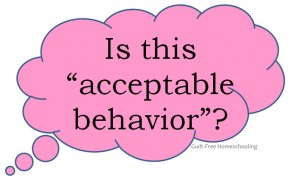As we congratulated the graduating homeschool senior, he addressed us as Mr. and Mrs. Morrison and thanked us for attending the ceremony. My husband fondly gripped his shoulder and chuckled, “You can call me by my first name — you’re an adult now.” The young man’s face showed a touch of embarrassment as he glanced around the room for his parents. “No,” he replied, “I can’t.” We understood. The graduate’s parents insisted that their children address adults by formal titles and last names only. To do otherwise was considered unacceptable behavior in their family.
Some parents instruct their children to call me Miss Carolyn, others call me Mrs. Morrison, and still others simply use my first name with no formal title, which is actually my preference as a very casual Midwesterner. The decision of how to address elders lies with each family and their preference for formality, and the manners are enforced by them, not by me. This philosophy also applies to “store manners,” “indoor voices,” “company behavior,” and other special occasions for which we have special rules. Each family sets and enforces its own guidelines for acceptable behavior.
When my children exhibited behavior that was inappropriate for the circumstances, I quietly took the offender aside and explained in age-appropriate language why this was not acceptable behavior and offered an alternative response so that the child would know how I expected him to act the next time. Removing the child from the public eye for this heart-to-heart chat avoided further embarrassment for either of us, thereby preventing revenge from becoming part of the mix. If an apology was required, I also tried to help the child see the situation from the opposing point of view, so that (hopefully) he could empathize with the offended party and offer a sincere apology.
Once the limits of acceptability have been established, the parent can simply ask the child “Is this acceptable behavior?” The child now knows the answer himself and can correct his actions without further discussion. Sometimes the parent may need to use a slightly firmer tact of “This is not acceptable behavior,” but the outcome should still be the same with the child correcting his own actions. If the child has successfully learned what is and what is not acceptable behavior, the parent does not need to go through the teaching process again any time a rule has been broken. To do so raises the child to the position of control in the situation — something no parent wants to have happen.
We have all been caught in the supermarket checkout lane when an over-tired toddler takes control of his harried parent. Either the child is immediately rewarded with candy, toys, and mechanical pony rides, or all the other shoppers in the store are subjected to his ear-piercing screams until he finally does get his way. (I am continually reminded by my young adult children, “You never let us get away with that behavior!” I am not sure if they are bothered more by the disruption or by the thought that they missed out on a lot of loot.) When my young children asked if they could have a toy or candy, I gave them a definite answer, either yes or no. In the case of a negative answer, they would often ask again a few seconds later. I always replied, “I already answered that. Will my answer change?” It took very few repetitions of this scenario before they learned to stop asking — Mom almost never changed her mind. Once they had learned not to beg and plead for trinkets and trifles, it was great fun for me to offer them a treat as a reward for good behavior. The reward was not given on every trip, though, lest it become expected and cease being a reward.
Expect your children to test the limits you set up. (See Parent Is a Verb for a more complete explanation of why children test boundaries.) Do not expect children to understand acceptable vs. unacceptable behavior unless a thorough explanation has also been given at some point in time. However, once the boundaries have been set, your word should remain law with only very rare exceptions allowed under extreme circumstances. Only occasional reminders should be necessary to correct unacceptable situations, keeping the parents in the seat of authority and keeping the children much happier with a lowered level of stress in the entire family.



 Guilt-Free Homeschooling is the creation of Carolyn Morrison and her daughter, Jennifer Leonhard. After serious disappointments with public school, Carolyn spent the next 11 years homeschooling her two children, from elementary to high school graduation and college admission. Refusing to force new homeschooling families to re-invent the wheel, Carolyn and Jennifer now share their encouragement, support, tips, and tricks, filling their blog with "all the answers we were looking for as a new-to-homeschooling family" and making this website a valuable resource for parents, not just a daily journal. Guilt-Free Homeschooling -- Equipping Parents for Homeschooling Success!
Guilt-Free Homeschooling is the creation of Carolyn Morrison and her daughter, Jennifer Leonhard. After serious disappointments with public school, Carolyn spent the next 11 years homeschooling her two children, from elementary to high school graduation and college admission. Refusing to force new homeschooling families to re-invent the wheel, Carolyn and Jennifer now share their encouragement, support, tips, and tricks, filling their blog with "all the answers we were looking for as a new-to-homeschooling family" and making this website a valuable resource for parents, not just a daily journal. Guilt-Free Homeschooling -- Equipping Parents for Homeschooling Success!

Speak Your Mind